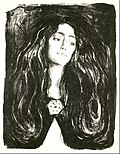express high negative affectivity view themselves and a variety of aspects of the world around them in generally negative terms. Negative affectivity is strongly...
38 KB (4,601 words) - 16:38, 3 March 2025
levels of negative affectivity, stemming directly from the individual's emotional sensitivity to negative emotions. This negative affectivity causes emotional...
178 KB (18,508 words) - 21:47, 8 June 2025
affectivity and negative affectivity and that each person has a certain level of both positive affectivity and negative affectivity. Hence, according...
27 KB (3,448 words) - 01:36, 24 May 2025
and Negative Affect Schedule (PANAS) is a self-report questionnaire that consists of two 10-item scales to measure both positive and negative affect. Each...
11 KB (1,363 words) - 09:16, 25 May 2025
high positive affectivity are typically enthusiastic, energetic, confident, active, and alert. Research has linked positive affectivity with an increase...
18 KB (2,053 words) - 01:08, 26 May 2025
and affectivity (an individual's overall disposition or temperament, which can be characterized as having a generally positive or negative affect). In...
53 KB (6,506 words) - 08:26, 30 May 2025
Core self-evaluations (section Comparisons with the Five-Factor Model and positive/negative affectivity)
conceptualization discrepancy. Big Five personality traits Negative affectivity Positive affectivity Job performance Job satisfaction Life satisfaction Locus...
52 KB (6,669 words) - 18:29, 10 March 2024
Emotional eating (section Negative affect)
high levels of the negative affect trait are related to emotional eating. Negative affectivity is a personality trait involving negative emotions and poor...
40 KB (4,752 words) - 00:21, 23 May 2025
Negotiation (section Negative affect)
Indeed, compared with negotiators with negative or natural affectivity, negotiators with positive affectivity reached more agreements and tended to honor...
93 KB (11,745 words) - 16:16, 25 May 2025
on negative affectivity are dysphoric and have a negative view of self. They are also prone to more somatic symptoms, and focus more on negative situations...
7 KB (921 words) - 20:55, 20 December 2024
of medical psychology, is defined as the joint tendency towards negative affectivity (e.g. worry, irritability, gloom) and social inhibition (e.g. reticence...
18 KB (2,078 words) - 21:25, 22 May 2025
Emotional self-regulation (section Affective)
can also be examined in terms of positive and negative affectivity. Positive and negative affectivity refers to the types of emotions felt by an individual...
84 KB (9,606 words) - 14:06, 22 May 2025
such as irresponsibility and risk taking. Negative affectivity: A disposition toward frequent and intense negative emotions, such as anxiety, sadness, anger...
34 KB (3,802 words) - 21:01, 7 June 2025
classification Negative affectivity Positive affectivity Self-report inventory Ekkekakis, Panteleimon; Russell, James A. (2013). The Measurement of Affect, Mood...
20 KB (2,589 words) - 13:29, 9 June 2025
In children and adolescents, psychologists speak of temperamental negative affectivity that, during adolescence, develops into the neuroticism personality...
45 KB (5,499 words) - 07:48, 30 May 2025
Negative feedback (or balancing feedback) occurs when some function of the output of a system, process, or mechanism is fed back in a manner that tends...
45 KB (5,039 words) - 19:51, 25 May 2025
respond more to positive affect than to negative affect, since they exhibit more positive-affect reactivity to the positive-affect induction, yet they do...
87 KB (9,739 words) - 14:33, 21 May 2025
can permanently alter affective processing. Lesioning the amygdala causes blunted affect responses to both positive and negative stimuli. This effect is...
24 KB (2,946 words) - 18:05, 24 May 2025
Job satisfaction (section Affect theory)
Specifically, this research describes the role of negative affectivity and positive affectivity. Negative affectivity is related strongly to the personality trait...
56 KB (6,880 words) - 13:50, 28 January 2025
accuracy in affective forecasting is greater for positive affect than negative affect, suggesting an overall tendency to overreact to perceived negative events...
80 KB (9,970 words) - 13:25, 23 May 2025
quiescence after negative affect. For example, Frederickson and Levinson showed that individuals who expressed Duchenne smiles during the negative arousal of...
61 KB (7,332 words) - 15:42, 5 June 2025
model relating human-likeness to affect. Yamada et al. found that cognitive difficulty was associated with negative affect at the midpoint of a morphed continuum...
85 KB (8,903 words) - 06:06, 6 June 2025
"positive affect", while the displays of more negative emotions, such as crying and tense gestures, is respectively termed "negative affect". Affect is important...
20 KB (2,666 words) - 15:55, 26 June 2024
Subjective well-being (section Affect)
from behavior-genetic studies that have found that positive and negative affectivity each have high heritability (40% and 55% respectively in one study)...
88 KB (10,671 words) - 14:58, 22 May 2025
10.1293 Watson, D., Clark, L., & Carey, G. (1988). Positive and negative affectivity and their relation to anxiety and depressive disorders. Journal of...
15 KB (2,109 words) - 18:24, 8 April 2024
Mood (psychology) (redirect from Negative mood (psychology))
to affect their judgments and perceptions. These negative moods may lead to problems in social relationships. For example, one maladaptive negative mood...
27 KB (3,288 words) - 08:24, 30 May 2025
suggests additional antagonistic traits for "malignant", and traits of negative affectivity for "vulnerable" manifestations of NPD. The patient must also meet...
101 KB (11,173 words) - 03:40, 9 June 2025
affects and minimizing negative affects. Affect should also be properly expressed so to make the identification of affect possible to others. Affect theory...
18 KB (2,185 words) - 16:56, 13 February 2025
trait domains that characterize pathological personality expression: Negative Affectivity, Detachment, Antagonism, Disinhibition, and Psychoticism. These domains...
161 KB (14,767 words) - 22:47, 7 June 2025
frame a speaker's affect, such as slender (positive affect) vs. scrawny (negative affect), thrifty (positive) vs. stingy (negative) and freedom fighter...
5 KB (708 words) - 07:47, 17 February 2025











